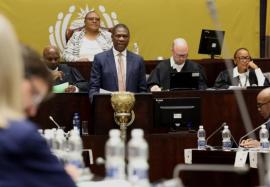
Deputy President Paul Mashatile has detailed government’s intensified efforts to tackle the pressing challenges facing local government.
During an oral reply session in Parliament, the Deputy President stressed the need for structural reforms to enhance municipal performance, which have been hindered by governance weaknesses and inadequate revenue generation.
The country’s second-in-command acknowledged the detrimental effects of poor municipal performance on the country’s growth and investment landscapes.
“The deteriorating levels of municipal performance have emerged as a significant constraint to growth and investment. As a result, several municipalities are affected by weak or unstable governance, poor revenue collection, and funding shortfalls,” he stated on Thursday.
He pointed out that various municipalities were grappling with serious governance and financial issues.
In response to these challenges, he told Members of Parliament (MPs) that Cabinet convened in September 2024 to establish the Inter-Ministerial Committee (IMC) on Municipal Performance Turnaround Plan (MPTP), chaired by the Minister of Cooperative Governance and Traditional Affairs (CoGTA).
This committee aims to implement strategies focusing on governance, service delivery, budget management, and mandatory Financial Recovery Plans across ten municipalities that have been classified as most distressed by the Presidency.
Deputy President Mashatile noted that eight of the identified municipalities have already begun developing their turnaround strategies in collaboration with the Technical IMC.
In a further effort, President Cyril Ramaphosa this week launched Phase 2 of Operation Vulindlela, which aims to introduce structural reforms across various sectors - including local government - over the next five years.
According to the Deputy President, two critical components of this phase involve a comprehensive review of the 1998 White Paper on Local Government and the Local Government Funding Model.
A discussion document has been published to stimulate public dialogue and feedback for a revised White Paper, expected by March 2026.
Meanwhile, the Metro Trading Services Programme (MTSP) will specifically target eight metropolitan municipalities to reform their trading services and improve financial, technical, and corporate performance from 1 July 2025.
These include the City of Tshwane, the City of Johannesburg, the City of Ekurhuleni, the City of Cape Town, eThekwini Municipality, Buffalo City Municipality, Mangaung Municipality, and Nelson Mandela Bay Municipality.
To address immediate service delivery issues in major urban centres, the President has introduced the District Development Model (DDM) support mechanisms, including the Presidential eThekwini Working Group and the Presidential Johannesburg Working Group.
These mechanisms provide vital technical and financial support to enhance service delivery in critical areas such as water and electricity distribution.
“Several interventions are being undertaken through these support mechanisms, including, but not limited to, providing technical and financial support for turnaround plans in water and electricity distribution,” he explained.
President’s Emergency Plan for AIDS Relief
Meanwhile, the Deputy President said government was working around the clock to prevent any negative effects that could result from the withdrawal of the President's Emergency Plan for AIDS Relief (PEPFAR).
The United States recently cut funding to key health programmes, such as PEPFAR.
He cited the UNAIDS report and other partners indicating that a funding withdrawal of the PEPFAR in South Africa without adequate replacement could lead to a significant increase in HIV-related deaths and new infections over the next 10 years.
“The abrupt withdrawal of the funding has resulted in job losses and a negative impact on the national response to HIV, TB, and STIs.”
However, he said, the recently established Working Group on Science, Technology, and Innovation Funding will advise Minister of Science, Technology and Innovation Blade Nzimande on the implications and impact of the recent withdrawal of funding on key research and development programmes in South Africa.
In the meantime, the Minister of Health Aaron Motsoaledi is engaging with the Minister of Finance Enoch Godongwana to discuss possibly funding these gaps from the fiscus.
In addition, the National Lotteries Commission has submitted a funding application for the “Close the Gap” HIV Treatment Campaign and the “End TB Campaign,“ which is being considered under its discretionary emergency funding.
“We are hopeful that all these resource mobilisation efforts will yield positive results, as we cannot afford to have service delivery gaps in health programmes, particularly those focusing on HIV and TB.
“We will continue with our efforts to find sufficient resources to sustain our health programmes.” – SAnews.gov.za


